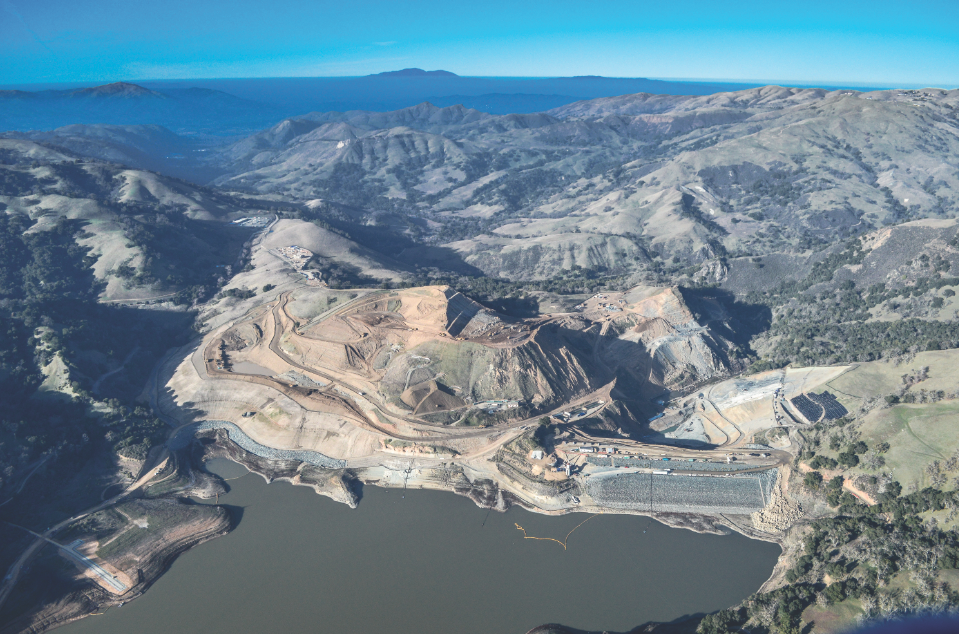Project News
Flatiron Construction Team Constructs New Rock-Fill Dam

Despite unforeseen delays that have now extended the project by over two years, the Calaveras Dam project continues to make good progress, with the Flatiron Construction project team optimistic about the future.
“We’ve had unforeseen geotechnical challenges since day one,” says Flatiron project manager Shawn Golden. “Because of that, we haven’t had the opportunity to really hit our stride on the project amidst the delays—but despite that, the project overall is going well.

The joint venture team began work on the $259 million contract in 2011. The project involves replacing the original Calaveras Dam, built in 1925, with a new 210-foot-tall earth and rock-fill dam designed to accommodate earthquakes on the Calaveras Fault. In addition to constructing the new dam next to the existing dam, which will later be submerged underwater upon project completion, workers will construct a new 1,550-foot-long concrete spillway, a new intake/outlet tower consisting of a 20-foot-diameter by 163-foot-deep vertical shaft and three new tunnels to convey water to and from the reservoir.
The project has overcome two significant challenges since the beginning. The first came from the discovery of foundation stability issues in one of the disposal sites, which required the team to significantly restructure the schedule for the owner in order to meet critical milestones and minimize overall project delays. The team was hoping to make up some time from the four-month delay, but then encountered another significant geotechnical challenge that required a new plan.
In June of 2012, the joint venture team encountered ancient landslide features on a large hill on the site, known as ‘Observation Hill’, that were not visible at the ground surface or apparent during the extensive pre-construction geotechnical investigations. These conditions could make the left abutment and spillway area unstable as it was designed, prompting a redesign of the excavation cut slope to make it flatter and more stable both during construction and over the lifetime of the dam. It also significantly increases the project scope, adding nearly 3 million yards of out-of-sequence excavation to the project schedule. The joint venture team was able to resume excavation work in October 2012, while finalizing the resulting change order and extended schedule.
“There are considerable challenges on a job of this size and in this area,” explains Shawn. “Beyond simply the magnitude of the job, we have technical and safety concerns, as well as extensive environmental restrictions we’re dealing with. In terms of the massive amount of earthwork, the issue of stormwater pollution plays a major role in the project planning, as we’re designated as a risk level 3 project, which is as tough as it gets here in California.”
Beyond the multiple protected species in the area—both animals and plants—workers are also contending with naturally occurring asbestos, which appears heavily on the job site and is just as heavily regulated. To meet the challenge, Flatiron has supplied environmental experts to the project team: certified industrial hygienist, Dan Hernandez and environmental biologist, Jason Phillips.
“It’s uncommon for a construction team to have full-time environmental and naturally occurring asbestos experts on staff to address those challenges specifically,” says Shawn. “It shows you how serious these challenges are—and how serious Flatiron is about successfully meeting them head on.”
Despite the challenges, hard work and communication are helping everything run smoothly.
“We’ve got a great culture amongst the team here,” adds Shawn. “Training is effective, everyone is in a tight communication loop, and we’re able to overcome challenges and accommodate changes quickly and effectively.”
The Calaveras Dam is part of the Hetch Hetchy Regional Water System that provides drinking water to 2.6 million people in Northern California. The water levels in the reservoir have remained at 40 percent capacity over the last 12 years, but once the project is complete, the water levels will once again be able to rise to the historically high capacity level of 31 billion gallons.
Want more Calaveras? Check out SF Water’s Sunol Valley blog for updates on the Calaveras project.
